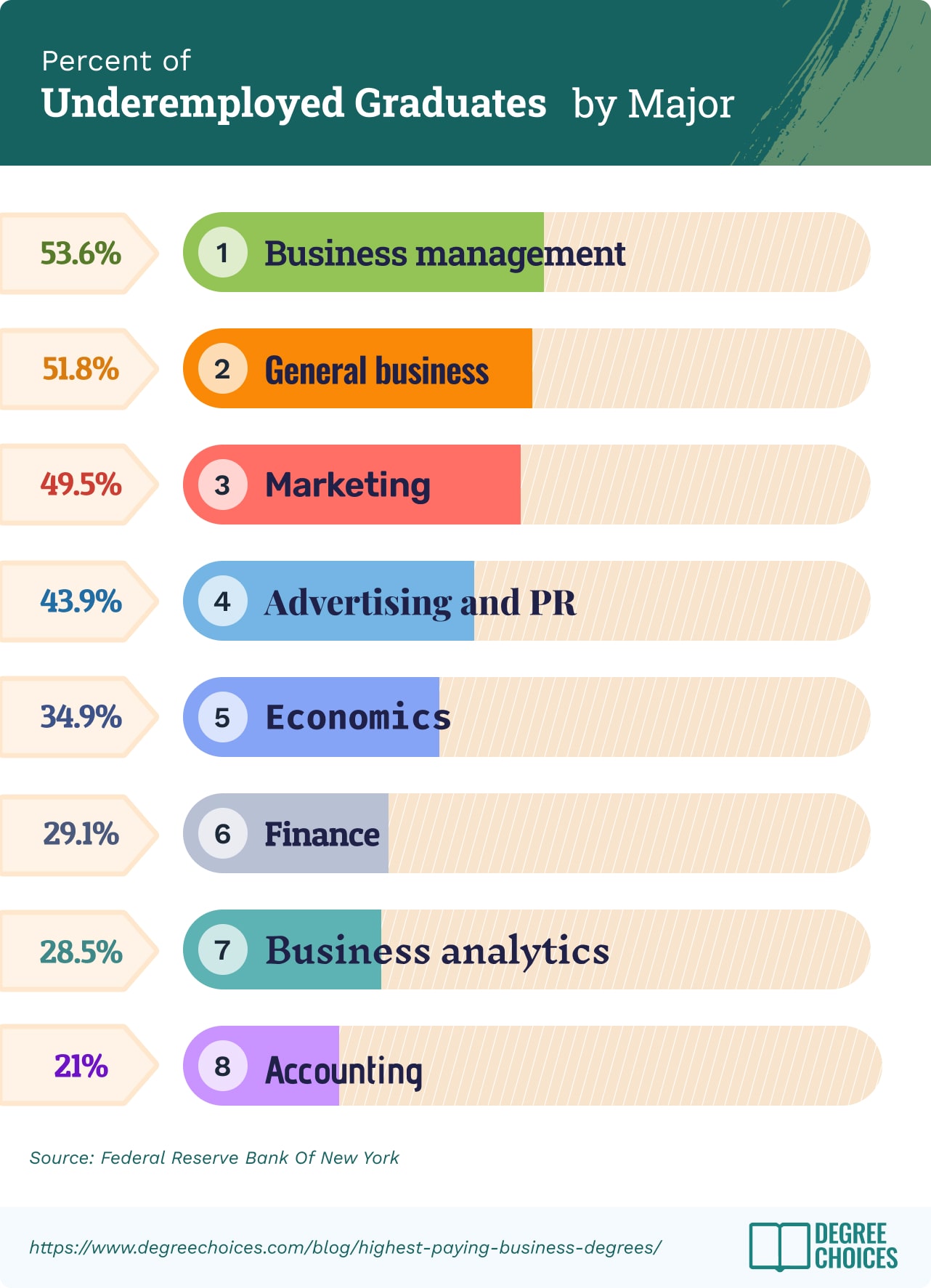Highest paying business degrees – 2024

At the bachelor’s level, the highest paying business-related degrees are insurance ($73,197 per year), IT management ($72,763), and economics ($72,568).
Business degrees such as accounting, business analytics, and finance have particularly low rates of underemployment – they reliably lead to a job after graduation.
Chief executives, IT managers, and marketing managers make the most money on average among all business jobs according to the BLS.
There are 8 bachelor’s in business administration programs in the U.S. whose graduates make 6-figure salaries just 4 years after leaving school.
Many roads lead to a job in business. For better or worse, most of those roads involve a university degree, unless you’re a one-in-a-million entrepreneur changing the world from your parents’ garage.
While success in business depends on many factors other than what you studied in college, government data shows that 4 years after graduating, some business degrees unlock far higher salaries than others (spoiler: number crunchers earn more).
To help you jump start your career, we reveal the highest-paying business degrees in 2024.
Highest paying business majors
We analyzed government data from IPEDS (2022-2023) to determine which types of business majors get paid the most 4 years after graduating.
IPEDS is a primary source from the National Center for Education Statistics. It publishes data on economic outcomes of degree programs for students who received at least $1 in financial aid. IPEDS categorizes degree types using CIP codes.
We looked at various undergraduate majors (which have been assigned a CIP code) that commonly feed into corporate and business-related jobs.
Note that this data is for all people with a particular degree – whether or not they are working in their field. We only show earnings info for degrees with 10 or more colleges disclosing data.
Perhaps unsurprisingly, the highest-paid business majors involve the most math: they are insurance ($73,197), IT management ($72,763), and economics ($72,568).
Meanwhile, 4 years after graduating, business studies majors make $60,089, while business administration majors make $57,086.
| Major | Earnings with a bachelor’s, 4 years on |
|---|---|
| Insurance | $73,197 |
| Information Technology Management | $72,763 |
| Economics | $72,568 |
| Finance | $72,454 |
| Actuarial Science | $70,479 |
| Business Economics | $67,685 |
| Sales | $63,063 |
| Accounting | $62,616 |
| International Business | $60,657 |
| Business Studies | $60,089 |
| Marketing | $58,618 |
| Business Administration | $57,086 |
| Corporate Communication | $55,990 |
| Human Resources | $55,204 |
| Advertising & PR | $52,866 |
| Entrepreneurship | $51,885 |
Source: IPEDS data
Highest paying business master’s degrees
The highest-paying business master’s degrees are business studies ($112,342), finance ($103,778), and actuarial science ($100,021).
Note that some degrees featured at the bachelor’s level have too few programs to rank at the master’s level.
Also remember that many businesspeople working in marketing, for example, choose to advance their careers through a master’s in business administration (MBA) rather than a master’s in marketing.
| Master’s degree | Earnings with a master’s, 4 years on |
|---|---|
| Business Studies | $112,342 |
| Finance | $103,778 |
| Actuarial Science | $100,021 |
| International Business | $87,900 |
| IT Management | $85,264 |
| Business Administration (MBA) | $82,456 |
| Accounting | $73,532 |
| Economics | $72,568 |
| Marketing | $66,937 |
| Advertising & PR | $65,226 |
| Human Resources | $62,159 |
Source: IPEDS data
Will my business degree land me a job in business?
Not everyone gets to put their college degree to use. While this is especially true for fine arts majors, it extends to business as well. Some types of business majors have higher rates of underemployment than others.
Underemployment is when you have a job – but not one that you need a degree for; in many cases, underemployed individuals struggle to pay back their student loans.
“Underemployment is when you have a job – but not one you need a degree for.”
According to the Federal Reserve Bank of New York, which tracks underemployment, the business majors with the lowest rates of underemployment are accounting (21%), business analytics (28.5%), and finance (29.1%).
Thus, people who study accounting are highly likely to land a job that requires a bachelor’s – presumably as an accountant. This makes accounting a great choice for people who don’t want to take unnecessary risks and are seeking a clear path to a solid career after graduation.
Meanwhile, the business degrees with the highest underemployment rates are business management (53.6%), general business (51.8%), and marketing (49.5%). These majors are more of a gamble: around half of all individuals with these degrees are not using them, although they potentially lead to very high-earning positions for some.

The highest paying business jobs
If you want to earn good money in business, your best bet is management. Management roles account for the vast majority of the top 25 best-paid jobs in business according to the Bureau of Labor Statistics (BLS).
To no-one’s surprise, the highest paying business job is chief executive. C-suite execs make a whopping $206,680 per year on average.
Next come IT managers ($169,510), advertising, promotions, and marketing managers ($156,580), and financial managers ($156,100).
For many, an important step to reaching management is getting a Master of Business Administration. See our breakdown of top-tier MBA programs for more information.
» Also read: What’s the difference between a B.B.A and a B.S.?
The highest paying business job without “manager” in the title is actuary. Actuaries, who are in charge of calculating the potential costs of insurance events, earn an average of $113,990 per year. Actuaries are math whizzes who need to pass a series of grueling exams to be fully qualified.
All the data in this section is sourced from the BLS. Click on the links for more information on these careers.
- Chief executives – $206,680
- IT managers – $169,510
- Advertising, promotions, and marketing managers – $156,580
- Financial managers – $156,100
- Compensation and benefits managers – $136,380
- Human resources managers – $136,350
- Sales managers – $135,160
- Agents/managers for artists, performers, and athletes – $132,810
- PR and fundraising managers – $130,480
- General and operations managers – $129,330
- Training and development managers – $125,040
- Actuaries – $120,000
- Sales rep for technical and scientific products – $113,520
- Data scientist – $108,020
- Administrative services and facilities managers – $104,900
- Financial analysts – $99,890
- Personal financial advisors – $99,580
- Management analysts – $99,410
- Project management specialists – $98,580
- Labor relations specialists – $89,980
- Budget analysts – $84,940
- Financial examiners – $84,300
- Operations research analysts – $83,640
- Accountants and auditors – $79,880
- Logisticians – $79,400
I majored in business and want to get rich: 12 tips on making it to management
You may have noticed that there is quite a gulf between earning a bachelor’s in business and securing a well-paid business job.
For example, while “marketing manager” is the 3rd highest-paid business job, the average person with a marketing degree is bringing home pretty underwhelming wages 4 years after graduating with a bachelor’s ($58,618 per year on average).
The most obvious solution is to get an MBA. However, the average MBA grad still only earns $82,456, 4 years on.
So how do you make the jump to a cushy job in management? We’re sure your LinkedIn feed has a lot of advice for you on that, but here our top 12 hints:
- Work hard: Few people can really “succeed in business without really trying.” Be a bit of an overachiever.
- Be patient: Most people don’t attain management positions early in their career.
- Be a life-long learner: Take every opportunity to upskill, cross-train, or learn new stuff. This could involve microcredentials, on-the-job training, or maybe an MBA.
- Be adaptable: This is called being “agile” in corporate speech. Don’t be afraid of change.
- Think outside the box: Companies reward individuals who can come up with original solutions to problems.
- Improve processes: Finding ways of making processes more efficient, predictable, effective, and simple is a major way to get noticed for promotions.
- See the big picture: Don’t lose track of your company’s ultimate goals and strategy.
- Pay attention to details: Managers are more than just “big picture people.” You also need to be comfortable picking apart data, rooting out errors, and finding patterns in numbers.
- Network: Develop informal relations with people in your industry. This can open doors to resources, mentorship opportunities, and new jobs.
- Be personable and emotionally intelligent: Charismatic people who understand what makes others tick get ahead.
- Be an effective communicator: You won’t get your original, out-of-the-box ideas through if you can’t get your message across.
- Think like a leader: Learn to inspire your team, delegate tasks, resolve conflicts, and make informed decisions.
Finally, you’ll need a good dose of luck (or, ahem, privilege). A lot of the time, success simply boils down to being the right person at the right place at the right time.
Is a business degree worth it?
Studying business can be worth it, but there are better majors out there. Let’s take the bachelor’s in business administration (B.B.A.) as an example. B.B.A. holders earn an average of $57,086 per year 4 years after graduation.
This means that B.B.A holders only earn about .4% less than the average person with a bachelor’s degree.
By value for money, a bachelor’s in business administration ranks below average according to our economic score metric.
» Also read: 20 online degrees that pay well
If you want to be sure of getting a high salary after you graduate, look to STEM degrees: majors like computer science ($100,386 per year), electrical engineering (90,728), or chemical engineering ($87,056) earn far higher average salaries, 4 years after graduating.
Use the degree comparison tool on our B.B.A. ranking page to compare different majors by value for money!
Best colleges for business – by average salary 4 years on
If you’re passionate about the buzzing world of business and determined to throw your hat in the ring, read on to discover the American universities with the highest earning B.B.A. grads.
Business degrees are very popular, and where you went to school still means a lot to some employers. Therefore, there is a huge salary range between graduates of top business schools and the rest of them.
People who majored in business at the 8 colleges below are making 6-figure average salaries just 4 years after completing their undergraduate degree.
| University | Average bachelor-level earnings, 4-years on |
|---|---|
| University of California, Berkeley | $123,780 |
| Carnegie Mellon University | $123,200 |
| University of Michigan, Ann Arbor | $116,095 |
| Emory University | $107,945 |
| Southern Methodist University | $105,314 |
| University of North Carolina at Chapel Hill | $105,246 |
| Manhattan College | $104,296 |
| Stevens Institute of Technology | $100,049 |
Source: IPEDS data
Best-value colleges for business
While the B.B.A programs on the list above are great, some of them are so expensive that their earning potential is compromised by loan payments.
To figure out which degrees are the best value, we have devised a formula that calculates which colleges offer the optimal combination of earnings potential and affordability, based on the concept of return on investment (ROI). The formula spits out an economic score; the lower the score, the better.
The best-value colleges for a B.B.A are shown below. Note that “net price” refers to the average price students pay per year – after financial aid but including room and board.
| College | Average net price | Average earnings, 4 years on |
|---|---|---|
| University of North Carolina at Chapel Hill | $12,414 | $105,246 |
| University of California, Berkeley | $17,371 | $123,780 |
| University of Michigan, Ann Arbor | $16,792 | $116,095 |
| CUNY Baruch College | $3,644 | $60,629 |
| Emory University | $24,142 | $107,945 |
| Carnegie Mellon University | $34,550 | $123,200 |
| University of Florida | $6,275 | $63,871 |
| Brigham Young University | $13,565 | $96,358 |
| Texas A&M University, Central Texas | $2,457 | $48,526 |
| Florida State University | $6,450 | $60,621 |
Source: IPEDS data
Final thoughts
A lot of Americans work in business, and some of them do pretty well for themselves. For many, a college degree was the first step on their journey.
If you want a business degree that will jumpstart your corporate career, choose one with good economic outcomes after graduation – as this article shows, this often means prioritizing more quantitative subjects.
If numbers aren’t your cup of tea, work on developing your soft skills – these can get you much farther than anything you learn in the classroom.
www.degreechoices.com is an advertising-supported site. Featured or trusted partner programs and all school search, finder, or match results are for schools that compensate us. This compensation does not influence our school rankings, resource guides, or other editorially-independent information published on this site.





